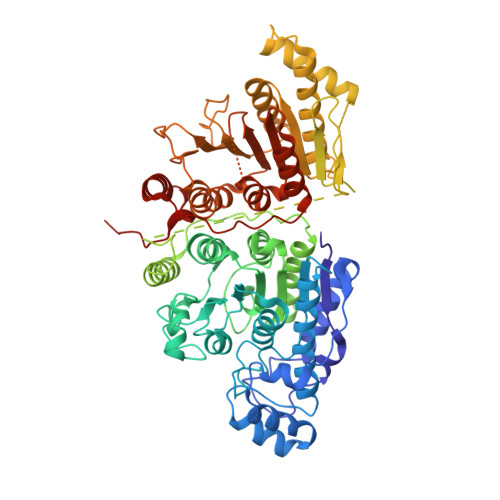Binding ofN8-Acetylspermidine Analogues to Histone Deacetylase 10 Reveals Molecular Strategies for Blocking Polyamine Deacetylation.
Herbst-Gervasoni, C.J., Christianson, D.W.(2019) Biochemistry 58: 4957-4969
- PubMed: 31746596
- DOI: https://doi.org/10.1021/acs.biochem.9b00906
- Primary Citation of Related Structures:
6UFN, 6UFO, 6UHU, 6UHV, 6UII, 6UIJ, 6UIL, 6UIM - PubMed Abstract:
Eukaryotic histone deacetylase 10 (HDAC10) is a Zn 2+ -dependent hydrolase that exhibits catalytic specificity for the hydrolysis of the polyamine N 8 -acetylspermidine. The recently determined crystal structure of HDAC10 from Danio rerio (zebrafish) reveals a narrow active site cleft and a negatively charged "gatekeeper" (E274) that favors the binding of the slender cationic substrate. Because HDAC10 expression is upregulated in advanced-stage neuroblastoma and induces autophagy, the selective inhibition of HDAC10 suppresses the autophagic response and renders cancer cells more susceptible to cytotoxic chemotherapeutic drugs. Here, we describe X-ray crystal structures of zebrafish HDAC10 complexed with eight different analogues of N 8 -acetylspermidine. These analogues contain different Zn 2+ -binding groups, such as hydroxamate, thiolate, and the tetrahedral gem-diolate resulting from the addition of a Zn 2+ -bound water molecule to a ketone carbonyl group. Notably, the chemistry that accompanies the binding of ketonic substrate analogues is identical to the chemistry involved in the first step of catalysis, i.e., nucleophilic attack of a Zn 2+ -bound water molecule at the scissile carbonyl group of N 8 -acetylspermidine. The most potent inhibitor studied contains a thiolate Zn 2+ -binding group. These structures reveal interesting geometric changes in the metal coordination polyhedron that accommodate inhibitor binding. Additional interactions in the active site highlight features contributing to substrate specificity. These interactions are likely to contribute to inhibitor binding selectivity and will inform the future design of compounds selective for HDAC10 inhibition.
Organizational Affiliation:
Roy and Diana Vagelos Laboratories, Department of Chemistry , University of Pennsylvania , Philadelphia , Pennsylvania 19104-6323 , United States.

















